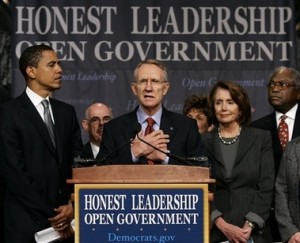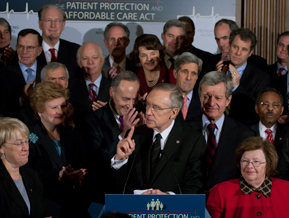
President Barack Obama, House Speaker Nancy Pelosi, and Senate Majority Leader Harry Reid May Want to Review CNN's Finding that 73% of the American Public Oppose Passing the Health Care Reform Bills before Congress now or Something Similar
This afternoon CNN released some troubling findings for the Obama Administration: Just 25% of the American public wants Congress to follow the lead of the newly released Obama Health Plan and pass a health care reform plan similar to the plans now before Congress. An overwhelming majority of Americans, 73%, prefer that Congress either start from scratch (48%) or stop work completely on health care reform (25%). Obama’s Health Plan contains essentially the same policies as the bill passed by the Senate, with the addition of price controls for health insurance premiums.
CNN buries the lede in its article accompanying the release of its findings, never mentioning that an overwhelming majority (73%) of the American public disapprove of passing a bill similar to the one before Congress, including four in ten Democrats who want the President and Congress to start over. CNN does manage to state that “nearly three quarters” of Americans want some kind of reform, including in that figure the 48% who want Congress to start over in that grouping in a somewhat dishonest fashion:
Washington (CNN) – Although the overall health care reform bills passed by the House of Representatives and the Senate are unpopular, many of the provisions in the existing bills are extremely popular, even among Republicans, according to a new national poll.
A CNN/Opinion Research Corporation survey released Wednesday also indicates that only a quarter of the public want Congress to stop all work on health care, with nearly three quarters saying lawmakers should pass some kind of reform.
Twenty-five percent of people questioned in the poll say Congress should pass legislation similar to the bills passed by both chambers, with 48 percent saying lawmakers should work on an entirely new bill and a quarter saying Congress should stop all work on health care reform.
…..
The poll’s release comes one day before a critical televised health care summit hosted by President Obama that will include top Congressional Democrats and Republicans.
The survey indicates nearly half of all Democrats say Congress should pass legislation similar to the bills passed by both chambers, with nearly 4 in 10 Democrats saying Congress should start from scratch and just 1 in 10 saying lawmakers should stop all work on health care.
A majority of Republicans questioned, 54 percent, want Congress to start from scratch, with just under 4 in 10 saying lawmakers should halt work on health care reform and just 6 percent saying Congress should pass into law the current legislation.
Fifty-two percent of Independents want Congress to start work on a new bill, with 27 percent saying lawmakers should stop all work, and 18 percent saying that the current legislation should be passed into law.
The final finding noted above in the CNN excerpt is truly incredible: a full 79% of Independents reject passing the current bills before Congress or something similar and only 18% of Independents favor moving forward with the present bills as advocated by the Obama Health Plan. That’s a 61 point gap between approval and disapproval, running against the plan initiated by the release of the Obama Health Plan last Monday and subsequent advocacy of the reconciliation process to circumvent the filibuster and push through Obamacare by the President and his Democratic congressional allies. With the mood of the country so clearly opposed to moving forward with the present bills or something similar in Congress, Obama must provide an incredible performance tomorrow to move public opinion back his way to convince nervous Democrats in Congress that proceeding with pushing through Obamacare now is in their best electoral interest.
UPDATE: Hotair points out that a new USAToday/Gallup poll taken yesterday shows the public opposed to Obama’s possible use of reconciliation to pass Obamacare by a 52%/39% margin and that only 22% of the public thinks the health care summit will result in a bipartisan deal.
White House press secretary Robert Gibbs indicated Monday that, if necessary, the White House was open to using a parliamentary maneuver known as reconciliation to bypass a prospective filibuster in the Senate. That means a measure could pass the Senate with a 51-vote majority rather than the 60 votes needed to end debate.
Americans are opposed 52%-39% to using that device to get a bill through.
The poll of 1,009 adults nationwide, taken by landline and cellphone Tuesday, has a margin of error of +/—4 percentage points.
UPDATE: Ace at Ace of Spades and Allahpundit at Hotair link over, thank you guys. Readers of Ace and Hotair please take a look around and leave a comment or three.
